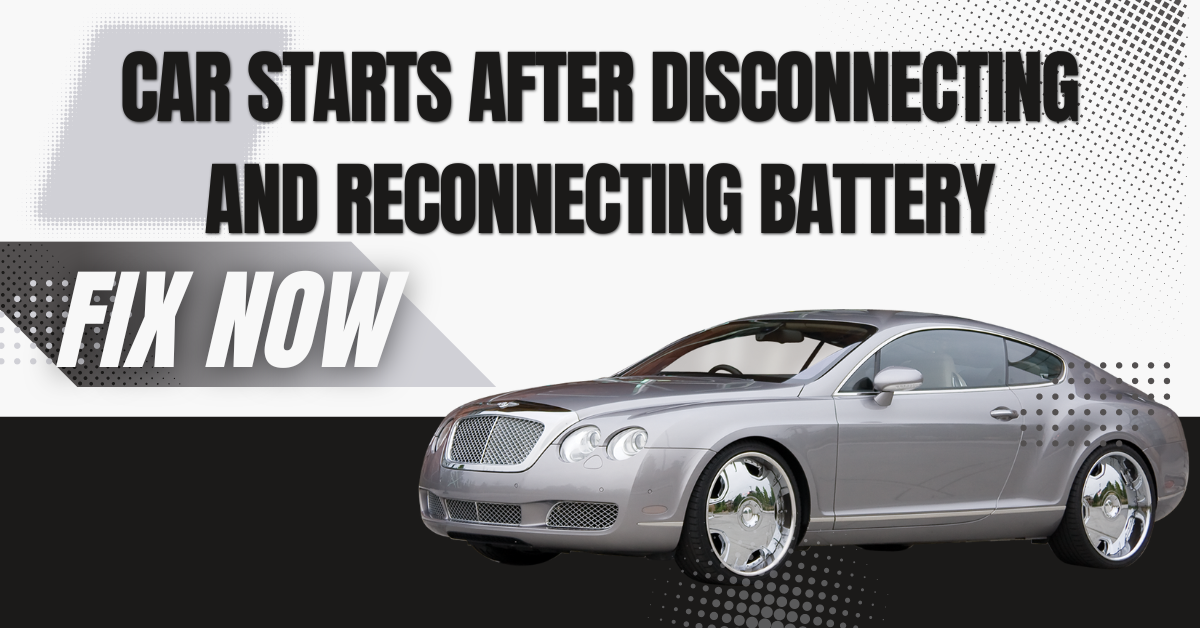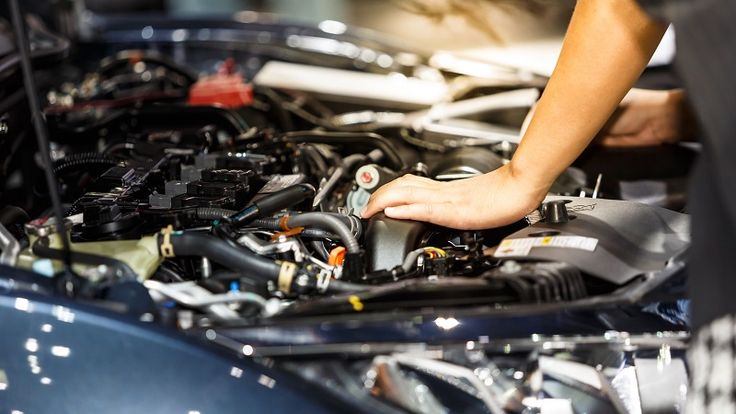
The time is running out, and you are late to go to your office because you must reconnect your battery and the car starts.
Some of the main reasons your car starts after disconnecting and reconnecting battery are corrosion, sensor reinitialization, starter motor, and computer problems in your car. But how many times do you reconnect a car battery and then start it?
Today, we will fix it. If your car starts after disconnecting and reconnecting the battery, just be with us, and we will fix it.
Why is the car battery essential when starting the car?
Your car battery is an important part of your car as it powers all its components.
When you start your car, the ignition switch sends signals to the starter motor, which is powered by the battery.
Moreover, your car battery powers all the components, including your headlights, AC, speakers, etc.
Why does Your car starts after disconnecting and reconnecting battery?
The reasons are given below:
Anti-Theft System Issues
The anti-theft system in your car is designed to protect your car from robbers.
When your car stands and disconnects the battery automatically, the issue is the anti-theft system recognizes it as a theft attempt.
So, when you try to start your car, you have to reconnect the battery.
Sensor Reinitialization
The sensor initialization is responsible for checking if all the car’s sensors and parts, including the engine transmission, safety features, and security systems, are properly working. So, it needs to reconnect a car battery to start, and it works properly.
Computer Problems in Cars
Computer problems in cars can significantly affect how the car starts after reconnecting and disconnecting the battery. Modern vehicles are equipped with Engine Control Units (ECUs) and other electronic systems that manage various vehicle functions, including starting.
Starter motor
The starter motor plays a critical role in starting a car by converting electrical energy from the battery into mechanical energy to crank the engine. If a car has trouble starting after the battery has been disconnected and reconnected, the starter motor could be one of the potential culprits.
Corrosion on terminals
Corrosion on the terminals of the car battery affects the car’s ability to start after reconnecting the battery.
The corrosion on the terminals of a battery can significantly drop the voltage across your car’s battery terminals.
This decrease in voltage affects the starter motor, making it difficult to start your car as the starter motor needs more voltage to start it.
Will the car stay running if the battery is disconnected?
The answer to this is yes. Your car will stay running if it is running, but this will prove harmful to your car.
The alternator still gives power to the engine for running, but without a battery, it will cause problems as voltage spikes may damage sensitive electronics and harm your car’s alternator.
So, I advise you not to drive your car without a battery.
How to fix
Fix Anti-Theft System Issues
- To Reset the System, follow the given steps
- Turn the key to the “On” position for 10-15 minutes until the anti-theft light stops flashing.
- Turn off the key, then try to start the car.
Use the Key Fob:
- Lock and unlock the car doors with the key fob to reset the system.
Check Fuses and Wiring:
- Inspect the fuses related to the anti-theft system.
- Check for damaged or corroded wiring, especially around the battery and ignition.
Battery Check:
- Ensure the battery is fully charged and in good condition.
Disconnect and Reconnect the Battery:
- Disconnect the battery for 10-15 minutes, then reconnect it to reset the system.
Fix Sensor Reinitialization
When reconnecting your car battery, you might face sensor reinitialization issues that can be resolved with a few steps.
First, after reconnecting the battery, turn the ignition to the “ON” position without starting the engine and leave it there for 2-5 minutes to allow the vehicle’s systems to reinitialize.
Then, drive the car for 10-15 minutes to recalibrate the sensors. Ensure the battery connections are secure, as loose terminals can hinder sensor initialization.
If issues persist, perform a hard reset by disconnecting the battery for 15-30 minutes. Check and replace any blown fuses or faulty relays related to the sensors.
Use an OBD-II scanner to check and clear error codes, or reset specific sensors.
Some vehicles may require relearn procedures for certain sensors, so consult your vehicle’s manual or a professional.
Additionally, check for software updates in the vehicle’s control modules, and inspect sensors for damage or debris, cleaning or replacing them as necessary.
Fix Computer Problems in Cars
If your car starts only after disconnecting and reconnecting the battery, it could indicate underlying issues with the vehicle’s electrical system. Here’s a step-by-step guide to help you troubleshoot and potentially fix the problem:
Check the connections of the battery. Check that terminals have no corrosion on it and also tighten the connections.
Now, check that if the car battery is fully charged or not. For this use a voltmeter and the reading for the ideal charged car battery is 12.6 volts.
The alternator of your car plays a vital role in recharging your car battery when running.
To check that the alternator of your car is properly working use a multimeter and connect it with battery terminals while the engine is starting. If the reading on the multimeter is between 13.7 and 14.7 then there is no more tension about it.
If the battery is losing charge quickly when the car is off, you may have a parasitic drain. To check, disconnect the negative battery terminal and connect a multimeter in series. If there’s a significant current draw (more than 50 milliamps), you may need to track down the source of the drain.
Disconnect the battery for 10-15 minutes to reset the ECU. If the car starts and runs fine afterward but the problem recurs, the ECU might need reprogramming or replacement.
Fix Starter motor
If your car only starts after reconnecting and disconnecting the battery, it may indicate issues with the starter motor or related components.
Start by checking the battery connections and ensuring they are clean and tight, as loose or corroded terminals can cause poor electrical contact.
Check the wiring to the starter motor and the starter relay for any signs of damage or wear.
If necessary, perform a bench test on the starter motor to see if it operates correctly; if it doesn’t, it may need repair or replacement.
Additionally, consider checking the ignition switch, fuses, and grounding connections.
If the problem isn’t solved, it could be related to the ECU or immobilizer system, in which case consulting a professional mechanic is advisable.
Fix Corrosion on terminals
The corrosion on the terminals of the car battery is also an issue.
Remove the corrosion from your terminals by pouring hot water on their terminals and then instantly clean them with a brush.
Conclusion
In conclusion, if your car starts after disconnecting and reconnecting battery, it could be due to several factors, including issues with the anti-theft system, sensor reinitialization, computer problems, the starter motor, or corrosion on the battery terminals.
Solving these issues by following the outlined steps can help restore your car’s reliability and prevent future starting problems. If the problem persists despite these fixes, consulting a professional mechanic is recommended to ensure your vehicle’s systems is functioning correctly.